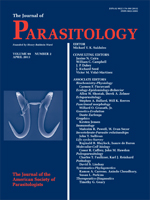The protozoan parasite Toxoplasma gondii is globally distributed, with considerable local variation in prevalence based on behavioral and environmental factors. To assess prevalence and estimate risk in Mali, we conducted a survey of 760 serum samples previously collected for malaria studies. A modified agglutination test detected antibodies in ∼27% of the adult population, with no significant differences between men and women, or between urban and rural study sites. In the village of Kolle, seroprevalence rose from 0% in infants (<1 yr, but after weaning of maternal immunoglobulin G) to 0.8% (1–5 yr), 2.7% (6–10), 11.3% (11–15), and 26.8% (>15); differences between the <10-, 11–15-, and >15-yr age groups were highly significant (P ≤ 0.01). We also observed an increase in anti–T. gondii antibody titers with age. Modeling the observed age distribution suggests a seroconversion rate of ∼1%/yr, indicating that congenital toxoplasmosis may be an under-appreciated public health concern in Mali.
How to translate text using browser tools
1 April 2013
Toxoplasma gondii Seroprevalence in Mali
Dinkorma T. Ouologuem,
Abdoulaye A. Djimdé,
Nouhoum Diallo,
Ogobara K. Doumbo,
David S. Roos
ACCESS THE FULL ARTICLE

Journal of Parasitology
Vol. 99 • No. 2
April 2013
Vol. 99 • No. 2
April 2013




